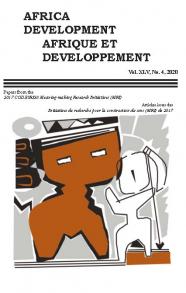Article(HTML) 29p.
When conducting research with historically marginalised peoples, such as Zimbabwe’s autochthonous San, it is necessary to observe the most sensitive ethical and methodological practice. The San are a group of people living largely on the edges of the contemporary market economy in the whole of southern Africa, including Zimbabwe. The San of Zimbabwe often work as unskilled labourers for their Ndebele and Kalanga neighbours in rural areas of Matebeleland. Historically, the San’s identity and culture was denigrated in popular oral and media myths. This article presents a theoretical and methodological approach steeped in critical social sciences and cultural studies to restore the San image through making the San themselves the constructors of contemporary cultural texts about their way of life using modern film and video technologies. The San tell their stories after being trained in filming and editing techniques by researchers from Midlands State University. The negotiation of space and status for both the visiting researcher-trainers and host-student San youths makes a fascinating reflexive reading of researcherresearched power dynamics. What eventually emerges is a scholarship that is cognisant of both existential humanism and the need for respectful engagement by the researchers from university citadels with ordinary people who are often belittled and exploited. Keywords: Zimbabwe San, action-research, critical social sciences, cultural studies, video-filming training, ethics



